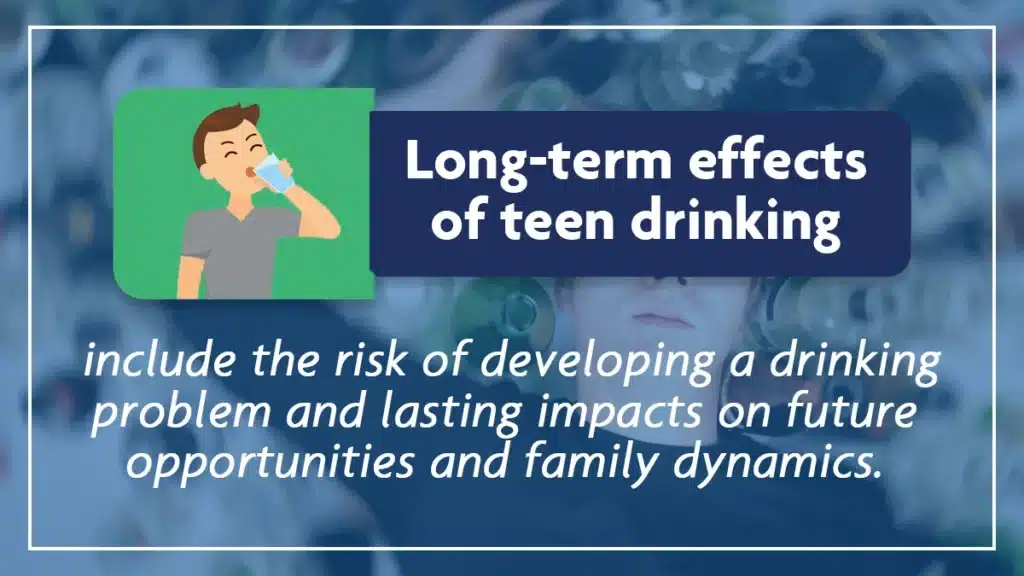Teen drinking is a prevalent concern impacting adolescents across the United States. Many young people engage in alcohol consumption, posing potential risks to their well-being. The allure of experimentation, peer pressure, and societal influences contribute to this behavior among teen kids.
This article will delve into the impacts of teen drinking, exploring its toll on physical health, mental resilience, and social interactions. In addition, we will discuss strategies to prevent teen drinking, aiming to equip parents, educators, and communities with tools to safeguard the well-being of adolescents.
Key Takeaways
Teen drinking poses significant risks, affecting physical, mental, and social well-being. Here is what this article touches upon:
- Physical problems may include impaired brain development, liver damage, weakened immune systems, and delayed growth.
- Mental effects encompass poor cognitive function, increased risk-taking behavior, mood swings, and a higher risk of mental illnesses.
- Social consequences comprise academic problems, legal issues, strained relationships, social isolation, and an increased risk of violence.
- Long-term effects include the risk of developing a drinking problem and lasting impacts on future opportunities and family dynamics.
- Preventing teen drinking involves the active role of family members, school-based interventions, and community programs.
Call (845) 479-6888 to learn more about how you can help your teen overcome alcoholism.
Physical Effects of Teen Drinking
Drinking during adolescence can have profound physical effects, impacting various aspects of their health and well-being. Understanding these consequences is crucial for promoting informed decisions and safeguarding the health of our youth.
Impaired Brain Development
The teenage brain is a dynamic and developing organ, making it particularly vulnerable to the effects of alcohol. Heavy drinking can impair cognitive functions, hinder memory formation, and disrupt the development of crucial brain regions. This interference during a critical period of growth may lead to long-term cognitive challenges.
Liver Damage
Excessive drinking places a strain on the body’s primary detoxifying organ, the liver. Teenagers engaging in drinking behaviors may unknowingly subject their livers to undue stress, potentially leading to inflammation, fatty liver disease, and, in severe cases, irreversible damage.
Weakened Immune System
The immune system plays a vital role in protecting the body against illnesses. Teen drinking weakens this defense mechanism, making adolescents more susceptible to infections, illnesses, and other health risks. A compromised immune system can impact the body’s ability to fight off diseases and recover from common ailments.
Delayed Growth and Development
Teen children undergoing a growth spurt may experience stunted growth and delayed development due to alcohol consumption. The interference with hormonal balance and nutrient absorption can impede the natural progression of physical maturity, affecting height, muscle development, and overall well-being.
Cardiovascular Issues
Teen drinking can contribute to cardiovascular problems, including high blood pressure and irregular heart rate. These issues pose significant risks to long-term heart health, potentially setting the stage for cardiovascular diseases in adulthood.
Mental and Emotional Effects of Teen Drinking
As adolescent boys and girls navigate the complexities of teenage years, the impact of alcohol on mental and emotional well-being becomes a critical concern. Understanding these harmful effects is vital for fostering a supportive environment that nurtures the emotional development of our youth.
Impaired Cognitive Functioning
Teen drinking can lead to impaired cognitive functioning, affecting crucial mental processes such as memory, attention, and decision-making. These cognitive deficits may hinder academic performance and limit a teenager’s ability to navigate the complexities of daily life effectively.
Increased Risk-Taking Behavior
Alcohol consumption often correlates with increased risky behavior in teens and young adults. Impaired judgment can lead to dangerous activities, such as unprotected sex, reckless driving, or engaging in the usage of illegal drugs, posing significant threats to their safety.
Mood Swings and Emotional Instability
Adolescents are already navigating a rollercoaster of emotions, and alcohol can exacerbate mood swings and emotional instability. The chemical impact of alcohol on the brain can intensify feelings of sadness, anxiety, or anger, disrupting healthy emotional development.
Risk of Mental Health Problems
Teenagers who engage in drinking are at a greater risk of developing mental health disorders. Conditions such as depression and anxiety may be exacerbated or triggered by alcohol abuse, underscoring the importance of early intervention and mental health support.
Vulnerability to Substance Abuse Disorders (SUDs)
Engaging in alcohol use during teen years increases the vulnerability to developing substance use disorders (SUDs) later in life. The risk is particularly heightened when alcohol is used as a coping mechanism for emotional challenges, creating a potential pathway to more severe substance abuse problems.
Social Consequences of Teen Drinking
Adolescent alcohol use not only affects individual health but also has profound implications for social dynamics. Understanding these social problems is vital to fostering a comprehensive understanding of the challenges associated with underage alcohol consumption.
Academic Problems
Engaging in alcohol use during a young age can lead to academic problems. Impaired cognitive functioning, reduced focus, and increased absenteeism can contribute to lower academic performance, hindering educational and future career prospects.
Legal Consequences
Underage drinking carries legal problems, adding a layer of complexity to a teen’s life. Legal issues, such as citations or arrests for underage drinking, not only disrupt a teenager’s present but can have lasting implications on their record and future opportunities.
Strained Relationships
Teen binge drinking often strains relationships with family and friends. Behavioral changes, mood swings, and a focus on alcohol consumption can lead to misunderstandings and conflicts, impacting the quality of relationships and support systems.
Social Isolation
Alcohol consumption may contribute to social isolation among teenagers. Those who engage in drinking behaviors may find themselves excluded or marginalized by peers who choose not to partake. This isolation can harm a teenager’s emotional well-being and sense of belonging.
Risk of Violence
The association between teen drinking and an increased risk of violence is a concerning social consequence. Alcoholic drinks can lower inhibitions and contribute to aggressive behavior, leading to conflicts, fights, or involvement in violent situations, further jeopardizing the safety of teenagers and those around them.
The Long-Term Effects of Teen Drinking

As teenagers navigate the challenges of growing up, the choices they make, particularly regarding the use of alcohol, can cast a lasting shadow on their future. Understanding the long-term effects of alcohol emphasizes the need for early intervention and preventive measures.
Increased Risk of Alcohol Addiction
One of the gravest long-term effects of teen drinking is the heightened risk of developing alcohol use disorder (AUD) later in life. Early alcohol exposure can pave the way for a lifelong struggle with dependency, emphasizing the importance of early intervention and education to break this potentially destructive cycle.
Development of Tolerance and Dependence
Younger people engaging in alcohol consumption may develop tolerance and dependence over time. What starts as experimentation can evolve into a reliance on alcohol to cope with stress or emotional challenges, intensifying the difficulty of breaking free from its grip.
Impact on Future Opportunities
The long-term impact of teen drinking extends to future opportunities. Academic and career prospects may be compromised due to a history of alcohol-related issues, limiting the potential for personal and professional growth.
Family and Social Impact
Teen drinking can strain family relationships, and these effects can endure into adulthood. The impact on trust and emotional bonds within the family can persist, affecting the individual’s ability to form and maintain healthy relationships throughout life.
Difficulty Breaking the Cycle
Breaking the cycle of alcohol dependence becomes increasingly challenging in the long term. The patterns established during adolescent years may persist, making it crucial to provide comprehensive support systems to help individuals overcome the hurdles of addiction and foster lasting recovery.
Collaborative Approaches to Prevent Teen Drinking
Addressing and preventing teen drinking requires a multifaceted approach involving families, schools, and communities. By understanding each role, we can collectively create an environment that guides adolescents toward responsible decision-making and healthy lifestyles.
Role of Family and Parents
Family and parental involvement are foundational in preventing teen drinking. Open communication, setting clear expectations, and fostering a supportive environment contribute to shaping responsible behaviors. Engaging in conversations about the risks and consequences of alcohol consumption establishes a foundation for informed decision-making and helps teens navigate peer pressures.
School-Based Interventions
Schools play a crucial role in educating and guiding teenagers towards responsible choices. Implementing evidence-based interventions within the school environment, such as educational programs and counseling services, equips students with the knowledge and skills needed to resist the temptations of underage drinking. School counselors also serve as key partners in identifying at-risk individuals and providing early intervention.
Community Programs
Community-wide initiatives are essential for creating a holistic approach to preventing teen drinking. Collaborative efforts involving parents, schools, law enforcement, and community organizations can provide a united front against the influences that lead to underage alcohol consumption. Community programs, events, and awareness campaigns contribute to building a culture that values and prioritizes the well-being of its youth.
Let Us Be Your Teen’s Partner in Recovery
We understand that navigating your teen’s struggle with alcoholism can be challenging. But remember, you’re never alone on this journey. Our medical professionals specialize in holistic healing, guiding your teen toward a healthier, happier future. The journey to recovery starts with your decision. Together, we can pave the way for a brighter tomorrow. Call us at (845) 539-0834 for more information.

Frequently Asked Questions (FAQ)
What to do if you catch your 16-year-old drinking?
Discovering your 16-year-old drinking can be alarming. Stay calm, initiate a conversation, express concern, and set clear expectations. Emphasize the risks, listen actively, and collaborate on a plan to prevent future instances. Seek professional advice if needed.
What are the short-term and long-term effects of teen drinking on the body?
Underage alcohol use has short-term effects like impaired judgment and coordination. Long-term consequences include liver damage, addiction risk, and negative impacts on teen brain development. Both can influence academic, social, and physical well-being.
How much alcohol does it take to damage a teenage brain?
Even small amounts of alcohol can harm a teenage brain. The developing brain is vulnerable, and alcohol can disrupt essential processes. It’s crucial to prioritize prevention and education to safeguard the well-being of our youth.
Guiding Teens to a Sober Tomorrow
If you’re a parent facing the challenge of your teenager struggling with alcohol addiction, remember, there is hope! At our teen treatment center, we specialize in providing a haven for teens to overcome addiction and build a path to a successful, sober life.
Our teen rehab facility offers personalized residential treatment in a supportive environment. Through a blend of therapeutic approaches like individual counseling, group therapy, and family sessions, we guide your teen toward recovery. Engaging activities like art and music therapy enhance the healing journey.
Time is of the essence! Act now and call us at (845) 479-6888.


